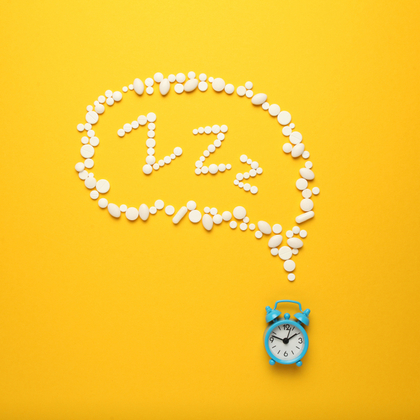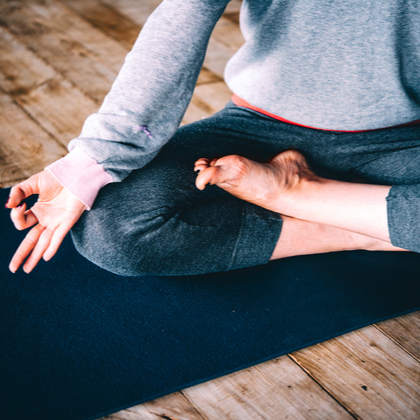
Sleep is like landing a plane; it takes time to descend. But in the era of sophisticated, hi-tech, round-the-clock jobs, and social media, many of us have lost the practices and rituals needed to prepare us for restful sleep. We struggle to switch off. We experience nocturnal anxiety. And our sleep suffers.
Aside from optimising your bedroom and making smart lifestyle choices, following a wind-down routine each night is another important pillar of healthy sleep hygiene. Here, we outline six relaxing techniques to help you sleep.
How can I relax my mind to sleep?
Many people find themselves in a state of mental hyperarousal before bed, ruminating about the past or catastrophising about the future, which isn’t conducive to high-quality sleep. To complicate matters further, sleep issues and poor mental health – especially anxiety and stress – are mutually reinforcing and can often make each other worsen.

Using mindfulness sleep exercises effectively breaks this negative feedback loop and relax your mind into sleep.
Visualisation
Otherwise known as guided imagery, visualisation helps shift your brain activity using specific images to promote a sense of calm and contentment.
In one study, researchers found that when participants pictured an environment where they felt peaceful and safe, it positively impacted their sleep latency and distressing pre-sleep cognitive activity1.
Visualisation involves imagining yourself somewhere inviting enough to pull you away from unwanted thoughts. As you’re lying in bed, try visualising an environment you feel happy and relaxed – a tranquil meadow, beach, or waterfall. You could even take yourself on your favourite walk.
Gratitude journaling
Research suggests an attitude of gratitude might be one of the best sleep relaxation techniques, encouraging deeper, longer, and more restful sleep2. A grateful outlook reduces pessimism and worry, and helps cultivate more positive thoughts as you fall asleep.
A 2011 study reported that journaling for just 15 minutes every evening helped participants worry less around bedtime and sleep more soundly3.
Before bed, consider writing down three to five things you feel grateful for that day. Picture what you’re thankful for and sit with that feeling. To make gratitude journaling a regular part of your bedtime routine, consider keeping a gratitude journal on your bedside table as a visual prompt.
Meditation
Mindfulness sleep exercises, like meditation, train you to be more grounded in the present moment instead of worrying about the past or the future, creating the optimal conditions for quality, restful sleep. When you settle the mind, you also settle the body – and this relaxation can make it easier to unwind and drift into sleep.
Research has identified that meditation supports sleep by lowering heart rate, activating the parasympathetic nervous system – responsible for your ‘rest and digest’ state – and slowing breathing4.
Try dedicating 10-15 minutes to a simple breathing meditation before bed. You can find a range of sleep meditations online or via an App.
Yoga
Yoga is widely regarded as one of the best relaxation techniques for sleep. Yoga combines all of the benefits of regular exercise with mediation, mindfulness, and conscious breathing, making it an extremely powerful tool to prepare the body and mind for sleep.
Most notably, research suggests yoga reduces stress and anxiety, which often interfere with sleep5. Mindfulness sleep exercises, like yoga, are also known to increase levels of the sleep hormone melatonin and even reduce night-time arousals6.
If you want to enjoy yoga nearer bedtime, we recommend a slow, gentle style, like Hatha, Yin or Yoga Nidra, which are especially helpful at relaxing the body and mind.
Deep breathing
Regulating your breath is another helpful technique to help you sleep. Research has found that deep-breathing exercises stimulate the parasympathetic nervous system, which relaxes the body, calms the mind, and, ultimately, prepares you for sleep7.
Although many variations of breathwork support sleep, the ‘4-7-8’ technique, developed by Dr Andrew Weil, has gained the most traction8.
To practise the ‘4-7-8’ breathing exercise, ensure you’re lying down in bed comfortably.
-
Put the tip of your tongue to the ridge of tissue just behind your upper front teeth.
-
Close your mouth and inhale silently through your nose for four seconds.
-
Hold your breath for seven seconds.
-
Exhale entirely through your mouth, making a ‘whooshing’ sound for eight seconds.
-
Repeat this cycle three more times.
Aromatherapy
Aromatherapy is one of the most widely used sleep relaxation techniques. When you smell something, your olfactory nerve sends signals directly to your amygdala and limbic system, areas of the brain responsible for memory and mood.
Lavender essential oil, in particular, has long been used to support sleep. Researchers found that subjects who inhaled lavender for two minutes at three, 10-minute intervals before bedtime improved their sleep quality and felt more energised when they woke up9.
Aside from inhalation, you could also dilute lavender essential oil in an essential oil diffuser, massage a few drops on specific areas of the body (neck, chest, hands, wrist or toes), add to a hot bath, or create a spray to spritz on your pillow.
Using relaxation techniques for sleep effectively improves your sleep hygiene and ensures you get high-quality rest every night. To learn more about improving your sleep hygiene, explore our dedicated sleep health resources.
References:
- Harvey. A. & Payne. S. (2002). The management of unwanted pre-sleep thoughts in insomnia: distraction with imagery versus general distraction. Behaviour Research and Therapy. 40(3), 267-277.
- Wood AM, Joseph S, Lloyd J, Atkins S. (2009) Gratitude influences sleep through the mechanism of pre-sleep cognitions. J Psychosom Res. 66 (1): 43-8.
- Digdon. N. & Koble. A. (2011). Effects of Constructive Worry, Imagery Distraction, and Gratitude Interventions on Sleep Quality: A Pilot Trial. Applied Psychology: Health and Well-Being. 3(2), 193-206.
- Harvard Health Publishing. (2013). Meditation offers significant heart benefits - Harvard Health. Available online: https://www.health.harvard.edu/heart-health/meditation-offers-significant-heart-benefits
- Goyal, M., Singh, S., Sibinga, E., Gould, N., Rowland-Seymour, A., Sharma, R., Berger, Z., Sleicher, D., Maron, D., Shihab, H., Ranasinghe, P., Linn, S., Saha, S., Bass, E., Haythornthwaite, J. and Cramer, H., 2014. Meditation Programs for Psychological Stress and Well-being: A Systematic Review and Meta-analysis. Deutsche Zeitschrift für Akupunktur, 57(3), 26-27.
- Zeichner, S. B., Zeichner, R. L., Gogineni, K., Shatil, S., & Ioachimescu, O. (2017). Cognitive Behavioral Therapy for Insomnia, Mindfulness, and Yoga in Patients With Breast Cancer with Sleep Disturbance: A Literature Review. Breast cancer : basic and clinical research, 11, 1178223417745564.
- Jerath. R., Beveridge. C. & Barnes. V. (2018). Self-Regulation of Breathing as an Adjunctive Treatment of Insomnia. Frontiers in Psychiatry. 9(780).
- DrWeil.com. (2021). Dr. Weil - Integrative Medicine, Healthy Lifestyles & Happiness. Available online: https://www.drweil.com
- Goel. N., Kim. H. & Lao. R.. (2005). An Olfactory Stimulus Modifies Nighttime Sleep in Young Men and Women. Chronobiology International. 22(5), 889-904
Related Posts

Olivia
Olivia Salter has always been an avid health nut. After graduating from the University of Bristol, she began working for a nutritional consultancy where she discovered her passion for all things wellness-related. There, she executed much of the company’s content marketing strategy and found her niche in health writing, publishing articles in Women’s Health, Mind Body Green, Thrive and Psychologies.
View More



